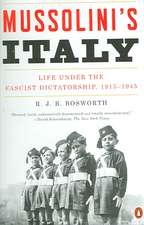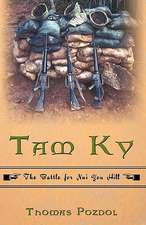Mussolini and the Eclipse of Italian Fascism: From Dictatorship to Populism
Autor R. J. B. Bosworthen Limba Engleză Hardback – mar 2021
An incisive account of how Mussolini pioneered populism in reaction to Hitler’s rise—and thereby reinforced his role as a model for later authoritarian leaders
"A passionately engaged history of a Mussolini and an Italy caught up in the monstrous gravitational waves engendered by the coming of Third Reich."—Giuseppe Finaldi, author of Mussolini and Italian Fascism
On the tenth anniversary of his rise to power in 1932, Benito Mussolini (1883–1945) seemed to many the “good dictator.” He was the first totalitarian and the first fascist in modern Europe. But a year later Hitler’s entrance onto the political stage signaled a German takeover of the fascist ideology.
In this definitive account, eminent historian R.J.B. Bosworth charts Mussolini’s leadership in reaction to Hitler. Bosworth shows how Italy’s decline in ideological pre-eminence, as well as in military and diplomatic power, led Mussolini to pursue a more populist approach: angry and bellicose words at home, violent aggression abroad, and a more extreme emphasis on charisma. In his embittered efforts to bolster an increasingly hollow and ruthless regime, it was Mussolini, rather than Hitler, who offered the model for all subsequent authoritarians.
"A passionately engaged history of a Mussolini and an Italy caught up in the monstrous gravitational waves engendered by the coming of Third Reich."—Giuseppe Finaldi, author of Mussolini and Italian Fascism
On the tenth anniversary of his rise to power in 1932, Benito Mussolini (1883–1945) seemed to many the “good dictator.” He was the first totalitarian and the first fascist in modern Europe. But a year later Hitler’s entrance onto the political stage signaled a German takeover of the fascist ideology.
In this definitive account, eminent historian R.J.B. Bosworth charts Mussolini’s leadership in reaction to Hitler. Bosworth shows how Italy’s decline in ideological pre-eminence, as well as in military and diplomatic power, led Mussolini to pursue a more populist approach: angry and bellicose words at home, violent aggression abroad, and a more extreme emphasis on charisma. In his embittered efforts to bolster an increasingly hollow and ruthless regime, it was Mussolini, rather than Hitler, who offered the model for all subsequent authoritarians.
Preț: 244.06 lei
Nou
Puncte Express: 366
Preț estimativ în valută:
46.70€ • 48.76$ • 38.65£
46.70€ • 48.76$ • 38.65£
Carte disponibilă
Livrare economică 14-28 martie
Preluare comenzi: 021 569.72.76
Specificații
ISBN-13: 9780300232721
ISBN-10: 0300232721
Pagini: 352
Ilustrații: 19 b-w illus.
Dimensiuni: 156 x 235 x 35 mm
Greutate: 0.79 kg
Editura: Yale University Press
Colecția Yale University Press
ISBN-10: 0300232721
Pagini: 352
Ilustrații: 19 b-w illus.
Dimensiuni: 156 x 235 x 35 mm
Greutate: 0.79 kg
Editura: Yale University Press
Colecția Yale University Press
Recenzii
‘In his inimitable style and with peerless erudition, Bosworth provides us with a passionately engaged history of a Mussolini and an Italy caught up in the monstrous gravitational waves engendered by the coming of Third Reich.’—Giuseppe Finaldi, author of Mussolini and Italian Fascism
‘This trenchant, eminently readable, book is a convincing analysis of the decline and fall of Fascism. Its conclusion – that Mussolini’s Italy was a “weak regime that went to its collapse broadcasting fake news about itself” – ensures that the book also has a contemporary ring.’— Professor Mark Gilbert, Johns Hopkins University
‘An original and fascinating analysis of the degeneration of the Italian Fascist regime in its last decade of peace, and of ‘the first modern dictator’s’ place in the broader context of contemporary history, especially in relation to present-day populist movements.’—John F. Pollard, author of The Vatican and Italian Fascism, 1929–32
"At a time when the specter of fascism haunts contemporary society, Bosworth provides a timely reminder that populist bluster tends to mask profound inadequacies. Benito Mussolini may have been the first modern dictator, but he was also a failure who led his nation to catastrophe.”—Professor Joshua Arthurs, West Virginia University
‘This trenchant, eminently readable, book is a convincing analysis of the decline and fall of Fascism. Its conclusion – that Mussolini’s Italy was a “weak regime that went to its collapse broadcasting fake news about itself” – ensures that the book also has a contemporary ring.’— Professor Mark Gilbert, Johns Hopkins University
‘An original and fascinating analysis of the degeneration of the Italian Fascist regime in its last decade of peace, and of ‘the first modern dictator’s’ place in the broader context of contemporary history, especially in relation to present-day populist movements.’—John F. Pollard, author of The Vatican and Italian Fascism, 1929–32
"At a time when the specter of fascism haunts contemporary society, Bosworth provides a timely reminder that populist bluster tends to mask profound inadequacies. Benito Mussolini may have been the first modern dictator, but he was also a failure who led his nation to catastrophe.”—Professor Joshua Arthurs, West Virginia University
Notă biografică
R.J.B. Bosworth is Emeritus Fellow at Jesus College, Oxford. He is a leading authority on Mussolini and is the author of more than two dozen books on fascism and Italy’s twentieth-century experience, including Claretta: Mussolini’s Last Lover. He lives in Oxford, UK.
Descriere
An incisive account of how Mussolini pioneered populism in reaction to Hitler’s rise—and thereby reinforced his role as a model for later authoritarian leaders




















